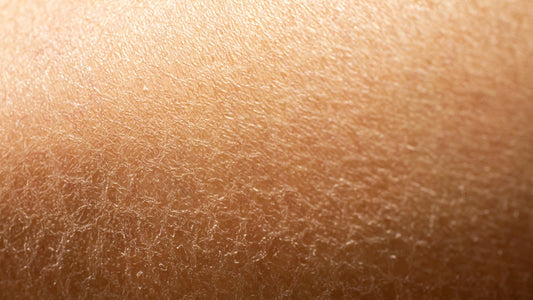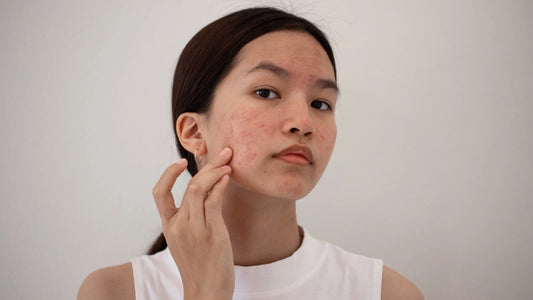Hydration is the second most important step in a beauty routine, because for the skin's processes to work properly, particularly cell renewal, it must be perfectly hydrated. Good hydration therefore concerns everyone, all skin types and at all ages.
Why hydration can improve skin health and appearance?
Here is some examples which show that good hydration is essential for the health of the skin in order to protect itself from external aggressions.
Improvement in the effectiveness of treatments and limits relapses.
In several studies of skin conditions like eczema, researchers have noted that using moisturizers in combination with treatments reduces the number of flare-ups as well as the amount of topical corticosteroids needed to achieve reductions. similar in severity of eczema. A moisturizer combined with an active treatment gives better results than the active treatment alone.
Reduced irritation and accelerated healing
Studies have also shown that hydration helps reduce irritation following the use of agents known to be irritating. For example, in the context of acne, certain treatments such as retinoids, benzoyl peroxide or high percentage azelaic acid can have side effects and be irritating to the skin. Data shows that combining these treatments with a moisturizer helps reduce irritation and side effects, thereby limiting dry skin.
In addition, many cosmetic ingredients such as panthenol, which is provitamin B5, are used to accelerate skin regeneration due to their moisturizing effect. Indeed, as the different layers of the skin undergo continuous renewal, moisturizers provide an environment that promotes the physiological processes necessary to maintain or restore the function of the skin barrier.
Reduction of imperfections
A study looked at whether petroleum jelly is a comedogenic ingredient in that it increases the number of blemishes. Also, several volunteers suffering from acne were asked to apply it daily. At the end of this study, researchers noted a significant reduction in acne lesions, demonstrating that petroleum jelly is not comedogenic. This study does not aim to show that petroleum jelly is an interesting ingredient for acne-prone skin, it simply indicates that hydration due to the use of petroleum jelly helps reduce imperfections. Indeed, when the skin is well hydrated, cell renewal, which is the fact that dead cells are replaced by younger cells on the surface of the skin, takes place correctly, thus preventing pores from being blocked by dead cells. This helps reduce the appearance of acne.
How to hydrate your skin?
Skin hydration is linked to the stratum corneum which is the superficial layer.
This has a brick and mortar type structure where the skin cells, which are the bricks, are held together by a mixture of lipids which therefore represents the mortar. These lipids are primarily made up of a mixture of ceramides, cholesterol and fatty acids and create a barrier that prevents water from escaping the skin. As for cells, they contain natural hydration factors, often abbreviated as NMF such as hyaluronic acid, lactic acid, urea, amino acids and sugars. NMF controls the hydration of skin cells and regulates the amount of water that flows in and out. So skin hydration depends on the NMF in the cells and the mixture of lipids that holds the cells together.
In cosmetics, there are three types of ingredients that affect skin hydration:
- Humectants
- Emollients
- Occlusives
Humectants
Humectants are ingredients with an affinity for water molecules. They hydrate the skin by two possible mechanisms: by forming a hydrolipidic film on the surface of the skin to reduce water loss. The water in the skin does not evaporate and attracts water molecules from the deeper layers of the skin to the upper layers. Among humectants in cosmetics, we find NMF: hyaluronic acid and other polysaccharides, amino acids, urea, etc.
Emollients
Emollients help soften the skin and support the skin barrier. They are also very important for the sensoriality of cosmetic products. In this category, we find lipids: oils, fatty acids, fatty acid esters, ceramides, cholesterol, etc. as well as certain silicones.
Occlusives:
The role of occlusives is to form a protective barrier on the surface of the skin to protect it from the external environment and maintain its hydration. In this category, we find mineral oils, waxes and butters.
Which moisturizers should you choose based on your skin type?
Even though hydration is essential for all skin types, the appropriate products will not be the same. For example, combination to oily skin mainly needs humectants and emollients. Therefore, you should favor light moisturizing products in the form of serums, gels, day cream or gel creams with active ingredients such as hyaluronic acid, amino acids, niacinamide.
For example, NOOĀNCE's multi-active plumping serum which contains active ingredients like hyaluronic acid and niacinamide is ideal with its lightness for adding a hydration step into your routine. It is used morning and evening after cleansing and is suitable for all skin types.
###multi-active-moisturizing-plumping-serum-5-hyaluronic-acids###
Dry skin needs humectants, emollients and also occlusives. So, in case of lack of hydration, you should favor moisturizing creams and balms rich with active ingredients such as ceramides, fatty acids, oils.
To make your routine more comfortable, it is also possible to apply vegetable oils at the very end of it in the evening. NOOĀNCE's prebiotic elixir contains 11 vegetable oils: jojoba oil, nigella oil, rice bran oil, hazelnut oil, prickly pear oil, safflower oil, hibiscus oil, moringa oil, cranberry oil, kahai oil and of Marula, combined with beta sitosterol as well as an innovative prebiotic, derived from extremophilic bacteria, that is to say resistant to extreme conditions, which also strengthens the microbiome and prevents skin aging.
###nourishing-elixir-with-prebiotics-10-precious-oils###
Sources:
- van Zuuren EJ, Fedorowicz Z, Christensen R, et al. Emollients and moisturizers for eczema. Cochrane Database Syst Rev. 2017;2:CD012119.
- Moisturizers for Acne What are their Constituents? Leena Chularojanamontri , MD, Papapit Tuchinda , MD, Kanokvalai Kulthanan , MD, and Kamolwan Pongparit , MD, J Clin Aesthet Dermatol. 2014 May; 7(5): 36–44.
- Petrolalumis notcomedogenicin rabbitsor humans: A critical reappraisal of the rabbitear assay and the concept of "acne cosmetica",ALBERT M. KLIGMAN j.Soc.Cosmet, 47,41 48 January/February 1996


